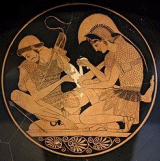
Greek mythology
Overview
Greek mythology is the body of myths and legends belonging to the ancient Greeks
, concerning their gods and heroes
, the nature of the world, and the origins and significance of their own cult
and ritual
practices. They were a part of religion in ancient Greece. Modern scholars refer to, and study the myths in an attempt to throw light on the religious and political institutions of Ancient Greece, its civilization, and to gain understanding of the nature of myth-making itself.
Greek mythology is embodied, explicitly, in a large collection of narratives, and implicitly in Greek representational arts, such as vase-paintings
and votive gifts.
Ancient Greece
Ancient Greece is a civilization belonging to a period of Greek history that lasted from the Archaic period of the 8th to 6th centuries BC to the end of antiquity. Immediately following this period was the beginning of the Early Middle Ages and the Byzantine era. Included in Ancient Greece is the...
, concerning their gods and heroes
Greek hero cult
Hero cults were one of the most distinctive features of ancient Greek religion. In Homeric Greek, "hero" refers to a man who was fighting on either side during the Trojan War...
, the nature of the world, and the origins and significance of their own cult
Cult (religious practice)
In traditional usage, the cult of a religion, quite apart from its sacred writings , its theology or myths, or the personal faith of its believers, is the totality of external religious practice and observance, the neglect of which is the definition of impiety. Cult in this primary sense is...
and ritual
Ritual
A ritual is a set of actions, performed mainly for their symbolic value. It may be prescribed by a religion or by the traditions of a community. The term usually excludes actions which are arbitrarily chosen by the performers....
practices. They were a part of religion in ancient Greece. Modern scholars refer to, and study the myths in an attempt to throw light on the religious and political institutions of Ancient Greece, its civilization, and to gain understanding of the nature of myth-making itself.
Greek mythology is embodied, explicitly, in a large collection of narratives, and implicitly in Greek representational arts, such as vase-paintings
Pottery of Ancient Greece
As the result of its relative durability, pottery is a large part of the archaeological record of Ancient Greece, and because there is so much of it it has exerted a disproportionately large influence on our understanding of Greek society...
and votive gifts.
Unanswered Questions
Discussions

